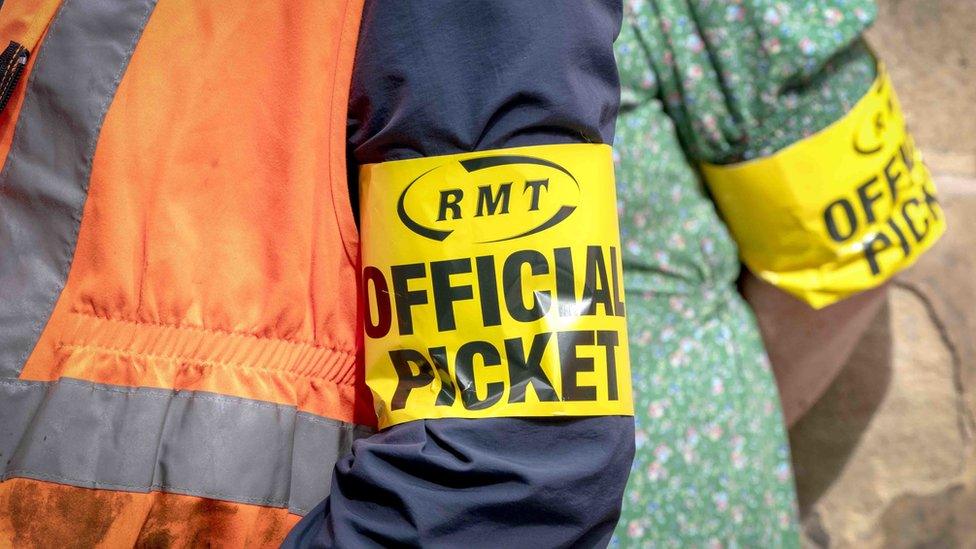Mark Drakeford to resist UK plans to repeal Welsh trade union law
- Published
- comments

Wales' First Minister Mark Drakeford has vowed to "resist" a proposal to repeal a Welsh law on how trade unions are regulated in the public sector.
The UK government said it would repeal a Senedd law that bans agency workers filling in for strike action in the NHS and other services.
Mr Drakeford accused the UK government of not informing ministers of its plan.
The UK government insisted that employment and industrial relations law was a reserved matter for Westminster.
But unions, the Welsh Labour government and Plaid Cymru have strongly criticised the plans to scrap the law which was agreed by the Senedd in 2017, shortly before Welsh devolution was changed to prevent new bills that cover industrial relations.
The UK government said at the time of the Trade Union Wales Act's passing that industrial relations were not devolved.
The policy area was not one of the subjects that the Senedd was originally envisaged to make laws on, but because of the way the parliament worked until 2017, it was not specifically prohibited either.
That changed when the reserved powers system was put in place - the same year the Welsh act entered the statute book.
Ministers in Westminster vowed at the time to reverse the changes, and they reiterated their intentions on Monday.
That is because the UK government wants measures to allow agency staff to cover for striking workers to apply to the whole of Great Britain.
As things stand, because of the Trade Union Wales Act, they will not apply to Welsh services controlled by the Welsh government.
The UK government said scrapping the ban on agency staff, which needs to be approved by the UK Parliament, would limit the impact of strikes.
Opponents said it would undermine pay and conditions. It is not clear when the Welsh law will be repealed.

Mark Drakeford said the plans were 'disgraceful'
Speaking on the Today programme Mr Drakeford accused the UK government of not telling the Senedd of its plans, and said ministers "discovered it tucked away" in documents published on Monday.
"It is absolutely disgraceful that the Westminster government should have announced its intention to do this without a single word to the Welsh government, without a single word to the Welsh Parliament.
"It just speaks volumes of the disrespectful agenda that this Westminster government has towards devolution and of course we will resist it."
He did not explain how the Welsh government would do that.
Mr Drakeford mocked the plans for agency workers, suggesting they would not be found to drive trains or operate signals.
"We've got a government absent on the job. It doesn't engage where it ought to engage and it indulgences in make believe sorts of policies in order to try to throw sand in people's eyes to disguise their own abject failures."
In a tweet, external, Counsel General Mick Antoniw accused the UK Tories of hating Wales and working people. "Maybe they just want to break up the UK? Maybe both," he wrote.
The UK government's announcement enraged unions on Monday.
General Secretary of Wales TUC Shavanah Taj said: "The Trade Union (Wales) Act 2017 was introduced to protect workers' basic rights.
"The UK government seems determined to attack both workers' rights and devolution in one go, by introducing an entirely unnecessary piece of legislation. It beggars' belief that in a cost of living crisis, this is their priority."
The Trade Union (Wales) Act also overturned a 40% support threshold for strike ballots, restrictions affecting time off for union activities and the taking of union subscriptions directly from pay packets.
Referendum call
Plaid Cymru leader Adam Price accused the UK government of showing "contempt" for devolution, challenging Mr Drakeford, during First Minister's Questions, to "request the power for a referendum on the future of our democracy".
He made the call shortly before Nicola Sturgeon explained her plans to hold a second referendum on Scottish independence.
Mr Price said Wales could have its vote based on the recommendations of a constitutional commission already established by Welsh ministers, and currently considering how the current system of powers resting in Cardiff and London could change.
The referendum could be "based on whichever model or models emerges from the constitutional commission that you've set up", Mr Price suggested.
"If it's framed as Wales versus Westminster, it's surely a referendum that we can win?"
But Mr Drakeford told Plaid Cymru's leader that the case he was making was "fatally weakened" by the fact that no political party promising such a referendum had won the majority of votes in Wales in an election.
A UK government spokesperson said: "While we continue to work with the Welsh government in a number of areas, it has always been the case that employment and industrial relations law is a reserved matter for the UK government.
"It is right that we seek to apply trade union law equally and fairly across Britain to ensure that services, such as train lines, are run as effectively as possible."
Related topics
- Published27 June 2022

- Published19 July 2017
